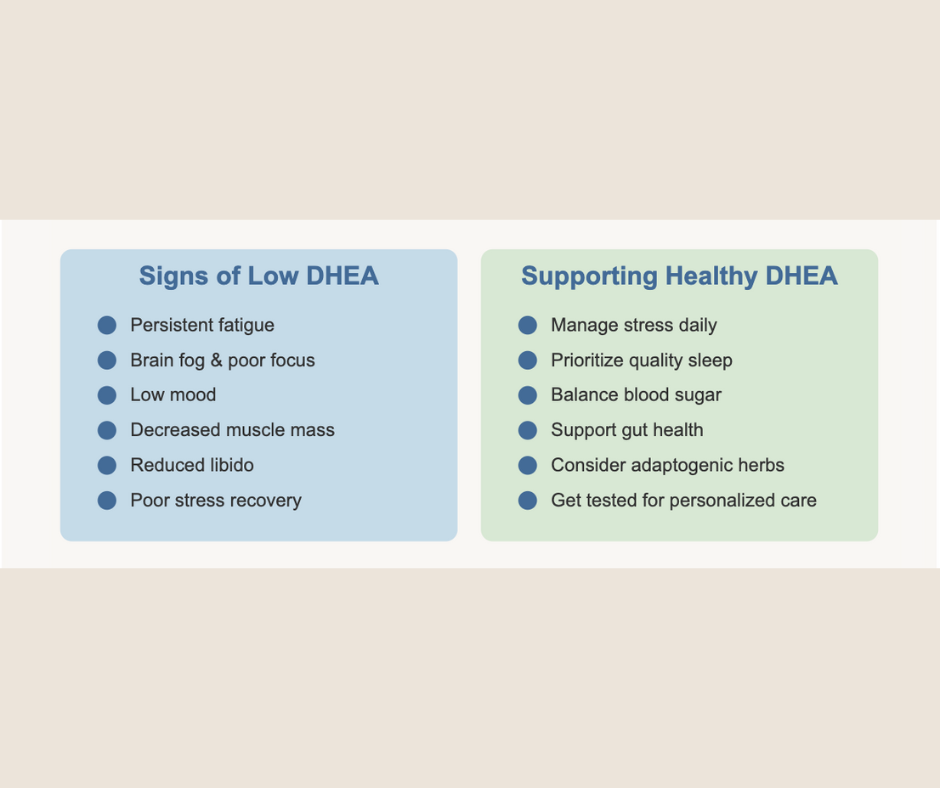Hey there! Stephanie here from Lake Town Wellness.
Today, we’re talking about a crucial hormone that might be the missing piece in your health puzzle – DHEA-S. I see so many clients struggling with fatigue, mood issues, hormonal imbalances, and even stubborn weight gain without realizing that their DHEA levels might be at the root of it all.
What is DHEA and Why Should You Care?
DHEA-S (Dehydroepiandrosterone Sulfate) is often called the “youth hormone” for good reason. It’s the most abundant steroid hormone in your bloodstream, produced mainly by your adrenal glands with smaller amounts coming from your brain and reproductive organs.
Think of DHEA as the parent hormone that helps create other essential hormones in your body – like estrogen and testosterone. But that’s not all it does! This powerhouse hormone influences:
- Your energy levels and metabolism
- Mood stability and stress resilience
- Immune function and inflammation control
- Reproductive health
- Muscle maintenance and bone density
This was my story, too – during my own health journey, addressing my DHEA levels was a game-changer for my energy, sleep quality, and overall resilience to stress.
The DHEA-Stress Connection You Need to Understand
Here’s something I see in my practice every day: chronic stress absolutely wrecks your DHEA levels.
When you’re constantly stressed, your body prioritizes cortisol production (your primary stress hormone) at the expense of DHEA. Over time, this creates a hormonal imbalance that can leave you feeling exhausted, foggy, and struggling with everything from weight gain to poor immune function.
Your body is brilliant, but sometimes it needs support. At Lake Town Wellness, we look at the WHY behind symptoms rather than just masking them with band-aid solutions.
Signs Your DHEA Might Be Low
Are you experiencing any of these common signs of low DHEA?
- Persistent fatigue even after a full night's sleep
- Brain fog and poor concentration
- Low mood or mild depression
- Decreased muscle mass despite regular exercise
- Reduced libido
- Weakened immune system (getting sick often)
- Poor recovery from workouts or stress
- Joint discomfort
- Sensitive to cold temperatures
If you’re nodding along to several of these, it might be time to check your DHEA levels.
Why DHEA Testing Matters
When we test DHEA-S levels (the stable, measurable form of DHEA in your bloodstream), we gain valuable insights into:
- Your adrenal function – Low levels often signal adrenal fatigue or chronic stress
- Hormonal balance – DHEA affects testosterone and estrogen production
- Metabolic health – DHEA influences how your body handles energy and stress
- Aging processes – Levels naturally decline with age, but too rapid a decline can accelerate aging
In functional medicine, we don’t just look at whether your numbers fall within the “normal” lab range. Instead, we look for optimal levels, where your body functions at its best.
For DHEA-S, functional medicine ideal ranges are:
- Men: 450-550 µg/dL
- Women: 200-400 µg/dL
These are the levels typically seen in healthy 20-30-year-olds when the body is functioning optimally.
Supporting Healthy DHEA Naturally
Before considering supplementation, here are some foundational strategies to support your body’s natural DHEA production:
- Prioritize stress management – Meditation, deep breathing, or gentle movement
- Optimize sleep – Quality sleep is when hormonal restoration happens
- Balance blood sugar – Insulin spikes can disrupt all hormone production
- Reduce inflammatory foods – Gluten, dairy, and sugar are common triggers for many
- Support gut health – Your gut microbiome influences hormone metabolism
- Consider adaptogens – Herbs like ashwagandha can help balance the stress response
For some clients, thoughtful supplementation may be appropriate after testing and a comprehensive health assessment. DHEA supplementation should always be monitored by a healthcare provider, as it can affect other hormones in your system.
Redefining Health with Root Cause Solutions
At Lake Town Wellness, we never just throw supplements at symptoms. We dive deep to understand the complex web of factors affecting your hormones, from gut health and nutrition to stress and sleep patterns.
DHEA is just one piece of your body’s intricate hormonal puzzle, but it’s an important one that’s often overlooked in conventional healthcare.
Ready to discover if your DHEA levels are supporting your health goals? I’d love to help you get to the root of your health concerns and create a personalized plan that addresses the underlying causes.
Call us at 501-436-2620 to schedule your Functional Medicine Consult or Hormone Management visit at our Heber Springs clinic.
To your vibrant health,
Stephanie Thompson, DNP, APRN, FNP-BC, CFMP

